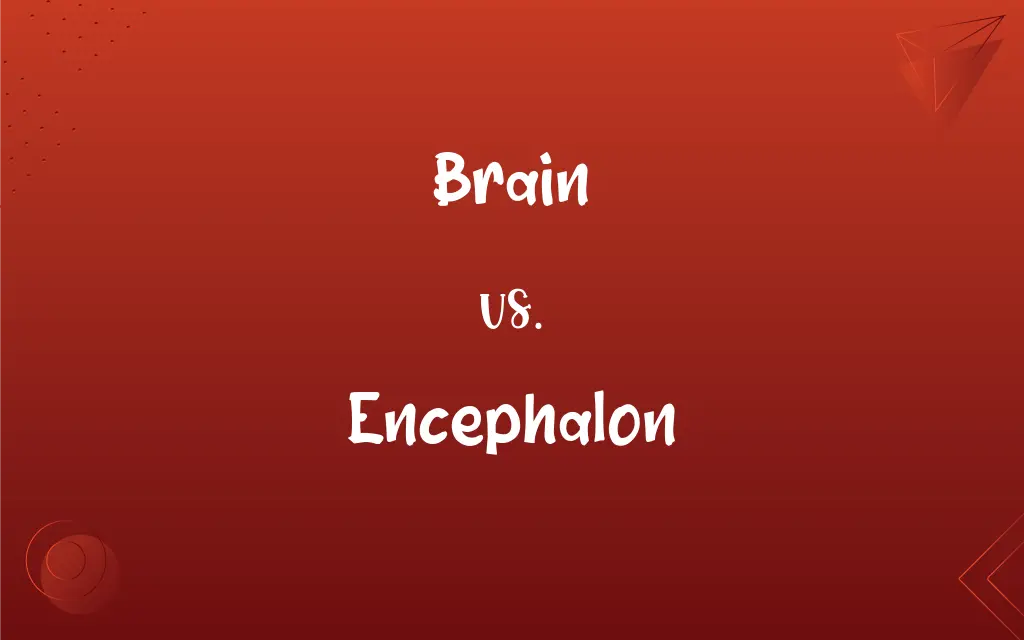Brain vs. Encephalon: What's the Difference?
Edited by Aimie Carlson || By Harlon Moss || Updated on November 8, 2023
The brain is the organ of thought; encephalon refers specifically to the brain within the cranial cavity.

Key Differences
The term "brain" is often used in a broad sense, referring to the central organ of the nervous system, housed in the skull, responsible for thought, perception, emotion, memory, and controlling voluntary movements. It is a common term used in everyday language and is recognized in various contexts, from biology to metaphorical usage.
"Encephalon" is the technical term for the brain when considered within the cranial cavity, including all its major structures such as the cerebrum, cerebellum, and brainstem. It is used more in scientific and medical contexts to describe the brain in a formal way, often when discussing its anatomical structure or functions.
When one speaks of the "brain," they could be referring to the organ as it relates to both its physical and psychological functions. This includes everything from neural processing to the abstract concept of the mind. It encompasses the entirety of the brain's structures but also its role in an individual's cognition and consciousness.
Conversely, "encephalon" is not typically used to refer to the psychological aspects or cognitive functions. Instead, it remains a term grounded in the physical realm, often used in neuroanatomy, neuroscience, and neurology. It does not carry the additional philosophical or psychological connotations that "brain" does.
"Brain" is a term familiar to people of all ages and backgrounds, while "encephalon" is typically reserved for professional use among healthcare providers, researchers, and students within the field of neurosciences. It's less likely for the layperson to use "encephalon" in everyday conversation.
ADVERTISEMENT
Comparison Chart
Usage
Common, everyday language
Technical, scientific language
Context
General and psychological
Anatomical and medical
Constituents
Implies all parts and functions
Strictly the physical structures
Connotation
Broader, includes mind concept
Purely anatomical
Audience
Public, all backgrounds
Medical professionals, scientists
ADVERTISEMENT
Brain and Encephalon Definitions
Brain
The brain is the complex organ located in the head, serving as the center of the nervous system.
The human brain is capable of complex thoughts and emotions.
Encephalon
The encephalon is the central part of the nervous system in vertebrates.
Comparative studies of the encephalon can reveal evolutionary patterns.
Brain
It is the source of all thoughts, emotions, and behaviors.
The artist's brain imagined colors that others couldn't perceive.
Encephalon
It is used specifically in neuroanatomy to describe the brain's physical properties.
MRI scans provide detailed images of the encephalon.
Brain
It is the seat of intelligence, interpreter of the senses, and controller of body movements.
The brain processes the scent of flowers as pleasant.
Encephalon
The encephalon is the focus of scientific study related to neurological diseases.
Research on the encephalon has advanced our understanding of Alzheimer's dis
Brain
The brain is often synonymous with the mind in philosophical discussions.
The mind's eye is a metaphorical expression of the brain's imagination.
Encephalon
The encephalon is the medical term for the brain housed within the skull.
The surgeon studied the encephalon's structure before the operation.
Brain
The brain is responsible for cognition, including learning, memory, and consciousness.
Her brain easily grasped new languages.
Encephalon
It includes the brain's main divisions: the cerebrum, cerebellum, and brainstem.
Trauma to the encephalon can affect both motor and cognitive functions.
Brain
The portion of the vertebrate central nervous system that is enclosed within the cranium, continuous with the spinal cord, and composed of gray matter and white matter. It is the primary center for the regulation and control of bodily activities, receiving and interpreting sensory impulses, and transmitting information to the muscles and body organs. It is also the seat of consciousness, thought, memory, and emotion.
Encephalon
The brain of a vertebrate.
Brain
A functionally similar portion of the invertebrate nervous system.
Encephalon
(neuroanatomy) The area of central nervous system that includes all higher nervous centers, enclosed within the skull and continuous with the spinal cord; the brain.
Brain
The mind
The plan took shape in her brain.
Encephalon
The contents of the cranium; the brain.
Encephalon
That part of the central nervous system that includes all the higher nervous centers; enclosed within the skull; continuous with the spinal cord
FAQs
What does encephalon mean?
Encephalon is the scientific term for the brain, especially within its cranial cavity.
Can "brain" and "encephalon" be used interchangeably?
While they refer to the same organ, "brain" is more common; "encephalon" is technical.
What is the brain?
The brain is the central organ of the human nervous system, located in the skull.
Who uses the term encephalon?
Medical professionals and neuroscientists typically use "encephalon."
Does the brain only refer to humans?
No, many animals have brains, not just humans.
Can diseases affect the encephalon?
Yes, diseases like encephalitis specifically affect the encephalon or brain.
What protects the brain?
The skull and meninges protect the brain.
Are the brain's functions the same as the encephalon's?
Yes, the functions are the same; the terms just differ in usage.
Is the encephalon distinct from the brain?
No, "encephalon" is just a formal term for the brain.
What studies the brain?
Neuroscience and psychology study the brain.
What studies the encephalon?
Neuroanatomy and neurology focus on the encephalon.
Does injury to the encephalon affect intelligence?
Yes, injury to the brain or encephalon can affect cognitive functions.
Is the brain visible during surgery?
Yes, the brain or encephalon is visible during neurosurgery.
Does the encephalon include the spinal cord?
No, the encephalon does not include the spinal cord.
Do all creatures with a brain have an encephalon?
Yes, in vertebrates, the brain within the skull is the encephalon.
How is encephalon health monitored?
Through medical imaging and neurological exams.
What protects the encephalon?
The same structures, the skull and meninges, protect the encephalon.
How do we keep our brain healthy?
A healthy diet, exercise, and mental activity can keep the brain healthy.
Can the encephalon regenerate?
Unlike other organs, the encephalon has limited regenerative capabilities.
What's the difference in studying the brain vs. the encephalon?
Studying the brain can include psychological aspects, while encephalon study is anatomical.
About Author
Written by
Harlon MossHarlon is a seasoned quality moderator and accomplished content writer for Difference Wiki. An alumnus of the prestigious University of California, he earned his degree in Computer Science. Leveraging his academic background, Harlon brings a meticulous and informed perspective to his work, ensuring content accuracy and excellence.
Edited by
Aimie CarlsonAimie Carlson, holding a master's degree in English literature, is a fervent English language enthusiast. She lends her writing talents to Difference Wiki, a prominent website that specializes in comparisons, offering readers insightful analyses that both captivate and inform.






























































